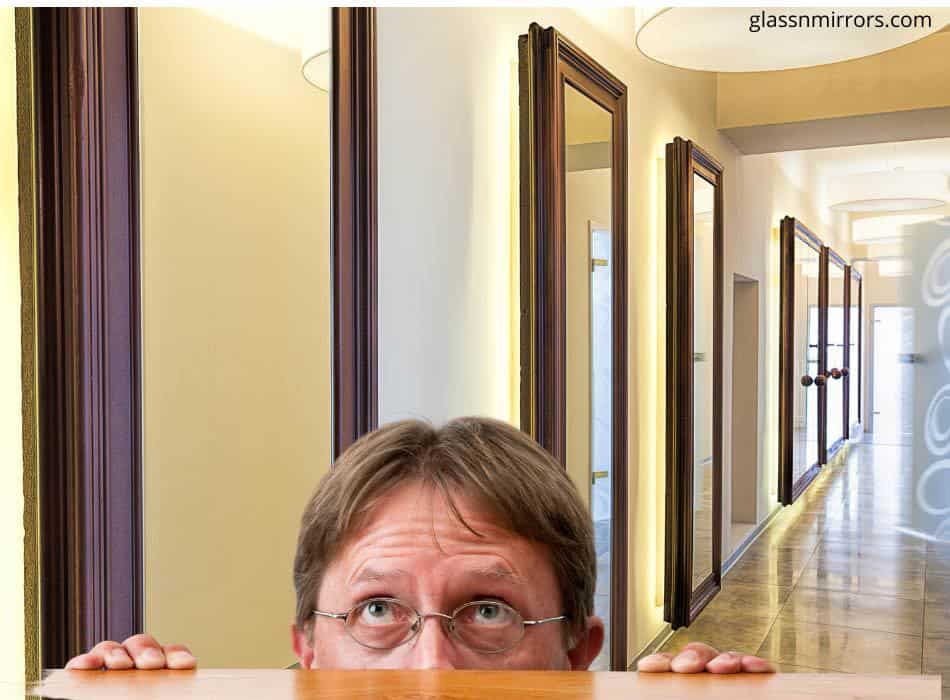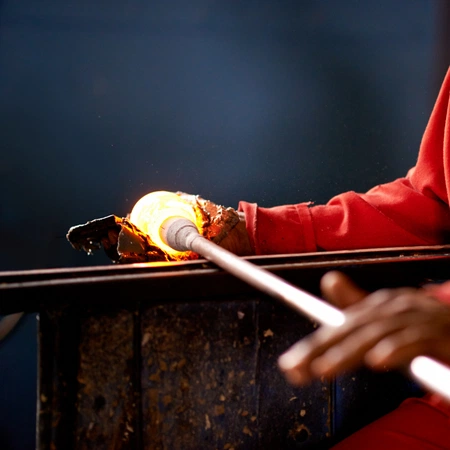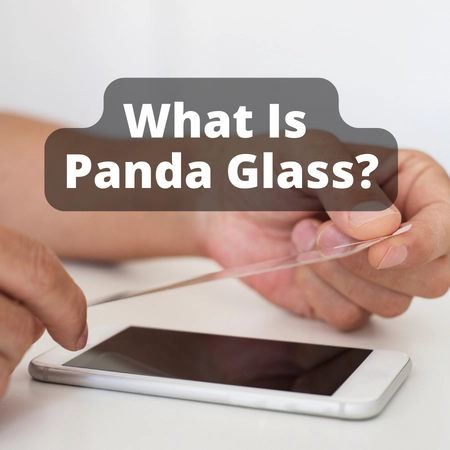If you want to know how you look, there’s no more reliable way to do so than to gaze into a mirror, right? Yet sometimes you feel like you’re at a carnival looking at a funhouse mirror because you seem shorter or wider than you know you are. Do mirrors make you look shorter?
Mirrors can make you look shorter, taller, fatter, and slimmer. If your mirror isn’t completely straight, then it’s altering what you see when you look at it, usually changing your stature. Household mirrors will become bent the longer you have them, which can make your reflection unreliable.
Could it be that you’ve gained a few pounds or that your mirror makes you look wider? If you look less attractive than usual, is the mirror to blame or is it something else? We’ll answer these questions and many more ahead, so make sure you keep reading!
Table of Contents
- 1 Do Mirrors Make You Look Shorter or Taller?
- 2 Do Mirrors Make You Look Worse?
- 3 Do Mirrors Make You Look Different?
- 4 How to Look More Like Your True Self When Using a Mirror
- 5 Remember That You’re More Attractive Than You Think
- 6 Conclusion
- 7 Hot Glass vs Cold Glass – What’s The Difference?
- 8 Can Quartz Be Made Into Glass? Guide On Quartz & Glass
- 9 What Is Panda Glass | Ultimate Guide To Panda Glass
Do Mirrors Make You Look Shorter or Taller?

We mentioned in the intro the phenomenon of funhouse mirrors. It’s amusing to see your midsection squished into a dramatic hourglass or your height smooshed so short that you’re under two feet tall. Yet when you come home from the carnival, can those types of changes occur when looking into a regular mirror, albeit to a lesser effect?
A mirror is, at the end of the day, a shaped piece of glass glued to a backing. Depending on how flat the mirror is, the accuracy of your reflection changes. However, if the mirror is completely straight and flat, then your reflection can be trusted.
If the center of the mirror is pushed out because it’s cheap or if the mirror becomes curved over time, then your reflection is now different.
See my article about mirrors making you look fat.
You’ll look shorter than you usually do but without any changes to your width. This creates the appearance of you have gained weight. You might panic and step on the scale only to realize that your weight hasn’t changed, yet when you look in the mirror, you seem heavier.
That’s not the only way a mirror can alter your weight, by the way. If only one axis of the mirror becomes a little curved, then you will also look fatter. A vertical extension or horizontal compression in the mirror will make you appear thinner.
Clothing retailers have been accused of using these so-called skinny mirrors in their dressing rooms to encourage you to buy their clothing. If you get home, try on the outfit again, and hate how you look, it’s because you don’t have the benefit of a skinny mirror in your bedroom.
Do Mirrors Make You Look Worse?
When you look in the mirror, you’re not just doing a body check, but gazing upon your face as well. You want to make sure your makeup is on-point and that your hair isn’t out of place. You primp and fix yourself up until you’re happy, then you go about your day.
Maybe you’re attending a work function or a friend’s party. Either way, someone takes photos of you. You’re confident when being photographed because you looked great in the mirror, yet the pictures are a different story entirely. You look awful, to put it mildly.
What about Mirror Lenses? Are mirror lenses any good? I explain the truth in this article.
Why is this? Is it a lighting thing? Maybe the photographer didn’t get your good side. While lighting and angles definitely do play a role in how attractive you look in the mirror vs. in photographs, that’s not the main phenomenon at work here.
The reason you look so different is that the mirror is you reversed and the photos aren’t. It’s easy to forget each time you use a mirror that what you’re seeing is you backward, well, unless you’re wearing a shirt with words printed on it. Then you remember that mirrors reverse their reflection. The same is true of your face.
Mirrors are all around us, in our homes and out in public. You see a mirror every single day, whereas you might not take photos of yourself daily. The mirror version of you is the one that you know the best and even the one you like better. This is what’s known as the mere-exposure effect.
According to this psychological principle, the more familiar you are with something (such as your face in the mirror), the more you grow to like it.
You may look shorter in a mirror. I revealed the truth!
Yet you have to remember that what you see isn’t truly you. It’s a reversal of your face. That’s why in photos that other people take, you think you look so different and even less attractive. You can also perceive yourself as far less photogenic than anyone else you know.
You’re familiar with their faces as they are–not the reverse–whereas you don’t have that same benefit for yourself. It’s not necessarily that you’re less photogenic or attractive.
If you’re thinking that you can take a hundred selfies a day to get used to the way you really look, that won’t work either. When your phone camera is in front-facing mode, it reverses the image like you’re looking in a mirror, further reinforcing the mere-exposure effect.
It’s only when your phone is in rear-facing camera mode that it’s not reversed. You’d have to take photos of yourself using rear-facing mode, which isn’t nearly as easy.
Do Mirrors Make You Look Different?
Have you ever noticed that you look, well, different in a mirror? It can’t just be your imagination, especially if the same effect occurs in various mirrors. So is it true, can a mirror really make you look different?
Mirrors make you look different since the reflection of you is not a true view of who you are. The angle of the mirror can also cause height and weight inaccuracies that aren’t present outside of the mirror.
Besides what the mirror shows, how you perceive yourself can also play a role in you looking different. For example, those with body dysmorphic disorder can pick apart their reflection in the mirror, assessing flaws that others don’t really see. However, at the end of the day, this has nothing to do with the mirror itself.
How to Look More Like Your True Self When Using a Mirror
You want to see yourself the same way everyone else does. Do keep in mind that getting a glimpse of the real you can do a number on your self-confidence at first until you adjust to what you really look like. If you still want to proceed, here’s what we recommend you do.
Buy a Mirror with Thicker Glass
The thicker the glass in a mirror, the less likely it is to distort. Your mirror should have 1/4th-inch plate glass or thicker. Then use that mirror primarily, especially when checking yourself out from head to toe.
Position Your Mirror Well
Leaning your mirror on the floor against a wall can still create distortions even with thicker glass, so where you put your mirror matters. If your mirror is long and tall, then mount it to the wall so it’s straight. By the way, whether your mirror is framed versus unframed shouldn’t make much of a difference in how you perceive yourself when using the mirror. That’s also true of shaped mirrors or whether the mirror is wall-mounted or stands on the floor.
Get Used to Seeing Your Unreversed Self Too
While seeing a more accurate reflection of yourself in the mirror is good for your self-confidence, don’t forget that who you’re looking at isn’t truly you. As often as you can, get photos taken of you so you can get to know what you look like to others.
At first, you’re going to want to pick out all your flaws. Ignore that urge and just sit with the photo for a minute, drinking in your features. The more you do this, the more you’ll adjust to yourself as you truly look, not the reversed mirror image. You might even grow to prefer the real you over your mirror image!
Remember That You’re More Attractive Than You Think
This can all be horribly depressing, realizing that the person you see in the mirror every single day isn’t who others see. We encourage you to not feel too bad about yourself.
Other people find the real you attractive, even more so than you might think of yourself. Canada radio station Beat 925 posted the results of a study done around 2020 that stated that up to 20 percent of everyone you meet thinks that you’re more attractive than you perceive yourself. Why is that?
Well, mostly because you’re focused on your appearance only and typically just the flaws. These people see the whole you, including your personality, sense of humor, compassion, kindness, warmth, and intelligence. These traits make you more attractive to other people, which is something that the mirror can never reflect!
Conclusion
Mirrors, depending on whether the glass is warped or perfectly straight, can make you look shorter, slimmer, or fatter. When looking into a mirror, your face is reversed, so you’re not seeing yourself the same way other people do. While using a mirror with thicker glass can fix the stature accuracy issue, self-confidence is ideal for helping you appreciate both your reflection and the person you see in photos!
-
Hot Glass vs Cold Glass – What’s The Difference?

When most people think of glass, they probably think of windows or drinking glasses. But there is a lot more to glass than that. In fact, there are two main … Keep Reading
-
Can Quartz Be Made Into Glass? Guide On Quartz & Glass

Glass making is a process that involves heating and cooling sand and other minerals. You may wonder whether it is possible to make glass out of quartz. Glass is made … Keep Reading
-
What Is Panda Glass | Ultimate Guide To Panda Glass

When looking for a new phone case, you may have encountered the term “panda glass.” A variety of phone cases on the market use this type of glass. But what … Keep Reading
